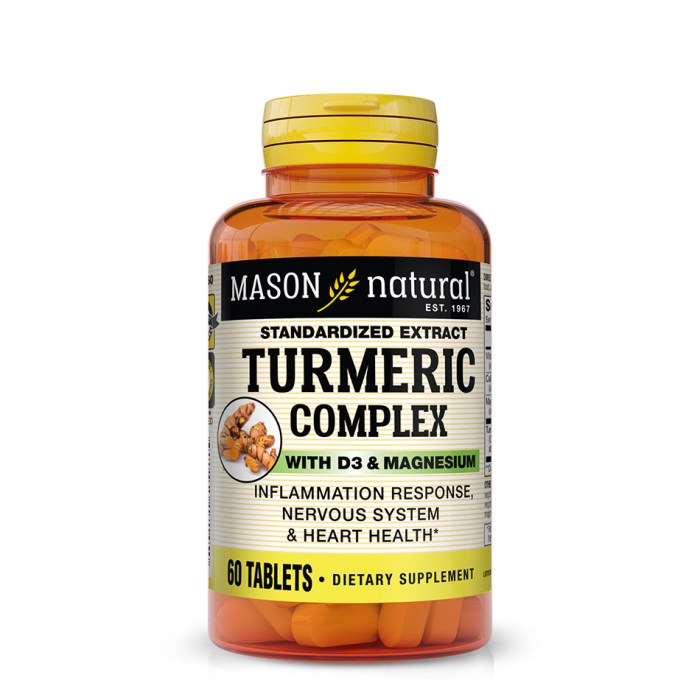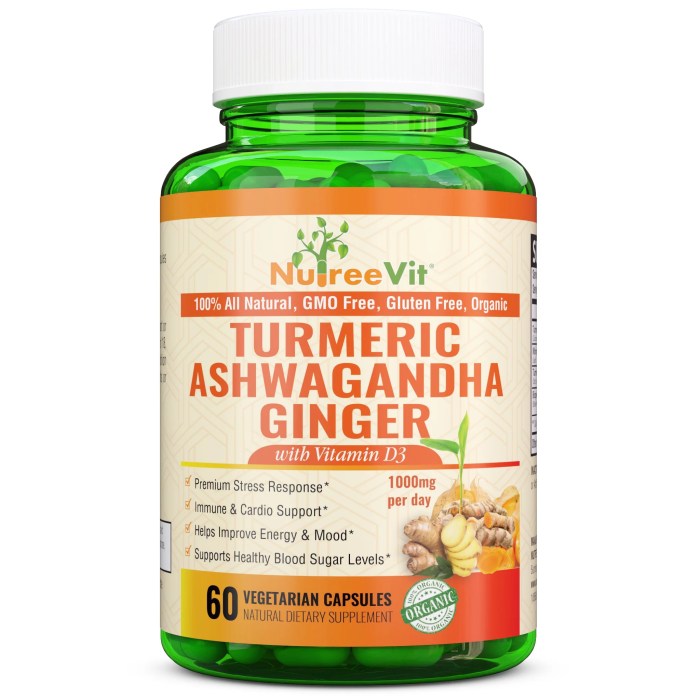Magnesium ashwagandha turmeric vitamin d – In the realm of natural health supplements, magnesium, ashwagandha, turmeric, and vitamin D stand as a formidable quartet, each possessing unique benefits that synergistically enhance overall health and well-being. Let’s delve into the captivating world of these extraordinary ingredients and unravel their remarkable potential.
From stress management to immune function, this dynamic combination offers a holistic approach to maintaining optimal health. Join us as we explore the individual powers of each ingredient and witness how they harmoniously work together to promote vitality and resilience.
Magnesium, Ashwagandha, Turmeric, and Vitamin D

Magnesium, ashwagandha, turmeric, and vitamin D are four powerful nutrients that offer a wide range of health benefits. When taken together, they can support overall health and well-being.These nutrients work synergistically to provide numerous benefits, including reducing stress, improving sleep, boosting immunity, and supporting cognitive function.
They can also help reduce inflammation, improve digestion, and promote healthy skin and hair.
Magnesium
Magnesium is an essential mineral that plays a role in over 300 biochemical reactions in the body. It is involved in energy production, muscle function, nerve transmission, and blood sugar control. Magnesium has been shown to reduce stress, improve sleep, and boost mood.
Ashwagandha
Ashwagandha is an adaptogenic herb that has been used in Ayurvedic medicine for centuries. It helps the body resist stress, both physical and mental. Ashwagandha has been shown to improve sleep, reduce anxiety, and boost energy levels.
Turmeric
Turmeric is a spice that contains curcumin, a powerful antioxidant and anti-inflammatory compound. Curcumin has been shown to reduce inflammation, improve digestion, and protect against chronic diseases.
Vitamin D
Vitamin D is a nutrient that is essential for bone health. It also plays a role in immune function, muscle function, and mood regulation. Vitamin D deficiency has been linked to an increased risk of osteoporosis, fractures, and depression.
Magnesium and Stress Management: Magnesium Ashwagandha Turmeric Vitamin D

Magnesium is a mineral that is essential for good health. It plays a role in over 300 different bodily functions, including energy production, muscle function, and nerve transmission.
Magnesium has also been shown to have stress-reducing effects. One study found that people who took 250 mg of magnesium per day for six weeks experienced a significant reduction in stress levels and anxiety.
Another study found that magnesium was as effective as the prescription drug Xanax for reducing anxiety.
How Magnesium Helps Reduce Stress
Magnesium works in a number of ways to reduce stress.
- It helps to regulate the production of cortisol, a hormone that is released in response to stress.
- It helps to improve sleep quality, which can help to reduce stress levels.
- It helps to relax muscles, which can help to relieve tension and stress.
Turmeric for Inflammation

Turmeric is a spice that has been used in traditional medicine for centuries. It contains a compound called curcumin, which has powerful anti-inflammatory properties. Studies have shown that curcumin can be effective in reducing inflammation in a variety of conditions, including arthritis, inflammatory bowel disease, and asthma.
Mechanisms of Action, Magnesium ashwagandha turmeric vitamin d
Curcumin works by inhibiting the production of inflammatory cytokines, which are proteins that promote inflammation. It also helps to reduce oxidative stress, which is a major contributor to inflammation. Additionally, curcumin has been shown to improve the function of the immune system, which helps to protect the body from infection and inflammation.
Vitamin D for Immune Function
Vitamin D plays a crucial role in supporting the health and proper functioning of the immune system. It contributes to the regulation of immune responses, ensuring a balanced and effective defense against infections and diseases.
Vitamin D and Immune Cell Function
- Enhances the production and activity of immune cells, including macrophages and natural killer cells, which are essential for eliminating pathogens.
- Promotes the differentiation and maturation of T cells, which play a central role in adaptive immune responses.
Vitamin D Deficiency and Immune Function
Deficiency in vitamin D can significantly impair immune function, increasing susceptibility to infections and chronic diseases. Research has shown that:
- Low vitamin D levels have been linked to an increased risk of respiratory infections, such as colds and influenza.
- Vitamin D deficiency may contribute to the development of autoimmune diseases, where the immune system mistakenly attacks healthy tissues.
Maintaining Optimal Vitamin D Levels
Maintaining optimal vitamin D levels is essential for immune health. Recommendations for daily vitamin D intake vary based on age and other factors. The following are some tips for ensuring adequate vitamin D intake:
- Sunlight exposure: The body produces vitamin D when exposed to sunlight. Aim for 10-15 minutes of unprotected sun exposure on the face, arms, and legs most days of the week.
- Dietary sources: Vitamin D is found in fatty fish, such as salmon and tuna, as well as fortified foods like milk, yogurt, and cereals.
- Supplements: If dietary intake and sunlight exposure are insufficient, consider taking a vitamin D supplement to reach recommended levels.
Dosage and Recommendations
Before incorporating magnesium ashwagandha turmeric vitamin d supplements into your routine, it is essential to consider appropriate dosages and potential interactions.
It is crucial to consult with a healthcare professional to determine the optimal dosage based on individual needs and health status. Self-medication can be harmful, and professional guidance ensures safe and effective supplementation.
Magnesium
Recommended daily intake of magnesium varies depending on age, sex, and overall health. The general range is 300-400 mg per day.
Ashwagandha
The recommended dosage of ashwagandha extract ranges from 300-600 mg per day, standardized to contain a minimum of 5% withanolides.
Turmeric
Turmeric supplements are typically standardized to contain 95% curcuminoids. The recommended daily intake is 500-1,000 mg.
Vitamin D
Vitamin D dosage recommendations vary widely depending on factors such as sunlight exposure, age, and health conditions. It is essential to consult with a healthcare professional to determine the appropriate dosage.
Potential Interactions and Contraindications
Some supplements may interact with certain medications or health conditions. It is crucial to disclose all current medications and medical conditions to a healthcare professional before taking any supplements.
For instance, magnesium can interact with certain antibiotics and diuretics. Ashwagandha may interact with thyroid medications and sedatives. Turmeric may interact with blood thinners and diabetes medications.
Pregnant or breastfeeding women should exercise caution when taking supplements. Always consult with a healthcare professional before starting any supplementation regimen.
Table of Benefits
Magnesium, ashwagandha, turmeric, and vitamin D are four natural ingredients that offer a wide range of health benefits. This table summarizes the key benefits of each ingredient:
| Ingredient | Benefits |
|---|---|
| Magnesium |
|
| Ashwagandha |
|
| Turmeric |
|
| Vitamin D |
|
Final Review
In conclusion, magnesium, ashwagandha, turmeric, and vitamin D form an exceptional alliance, providing a comprehensive solution for stress management, adrenal support, inflammation reduction, and immune function. By incorporating these natural remedies into our daily routines, we empower our bodies to thrive, fostering a profound sense of well-being and resilience.
FAQ Guide
Is it safe to combine all four ingredients?
Yes, these ingredients are generally safe to combine. However, it’s always advisable to consult with a healthcare professional before taking any supplements, especially if you have any underlying health conditions or are taking medications.
What is the recommended dosage for each ingredient?
The optimal dosage may vary depending on individual needs and health status. It’s best to follow the recommended dosage on the supplement label or consult with a healthcare professional for personalized guidance.
Can these ingredients help improve sleep quality?
Yes, some of these ingredients, such as magnesium and ashwagandha, have been traditionally used to promote relaxation and improve sleep quality. However, it’s important to note that individual responses may vary.